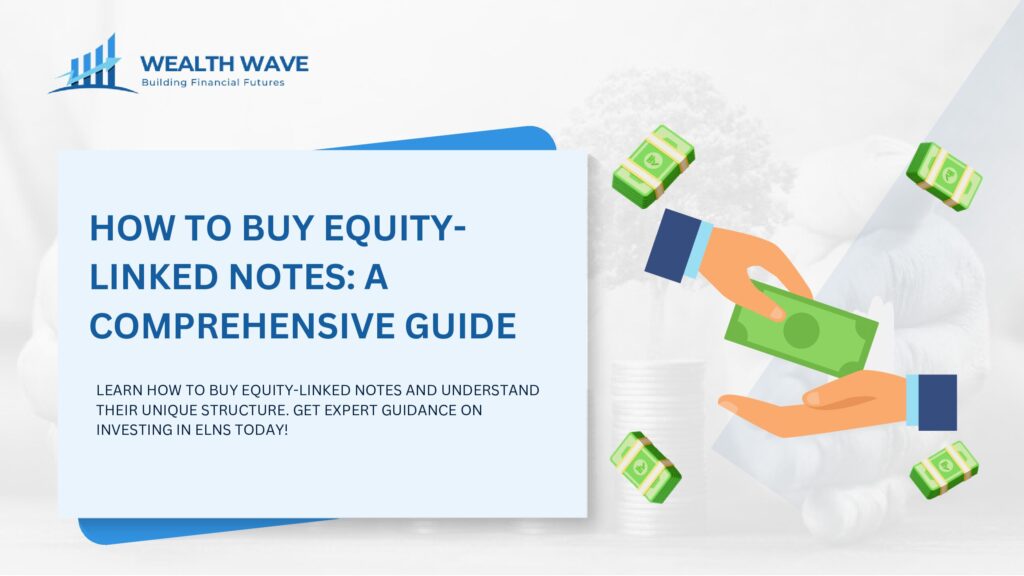Investing can be confusing, especially with so many options out there. People often wonder how to grow their money wisely. One interesting option is equity-linked notes (ELNs). These are not your usual investments because they don’t pay a fixed interest rate.
An important fact about ELNs is that when someone buys them, the issuer takes this money and buys a zero-coupon bond. Then, they use what’s left to buy other financial tools. This article will guide you on how to buy equity-linked notes, understanding their structure and seeing if they fit your investment plan.
Ready? Let’s start learning more!
Key Takeaways
- Equity-linked notes mix stocks and bonds but don’t pay fixed interest. They can offer higher returns but come with more risk.
- Before buying, it’s important to understand how ELNs work, the risks involved, and any tax effects on earnings.
- To buy ELNs, pick the right type for your goals, know its pricing and terms, and work with a stock broker.
What are Equity-Linked Notes?

Equity-Linked Notes are a type of investment. They combine features of stocks and bonds.
Definition and Features

An equity-linked note (ELN) is a structured product that offers unique features. It does not pay a fixed interest rate like traditional bonds. Investors buy an ELN to gain exposure to stock market returns and other financial instruments.
The issuer uses the investor’s money primarily to purchase a zero-coupon bond, while the rest goes towards buying additional financial products.
These notes come with different types, each having specific benefits and risks. They can yield higher returns compared to regular fixed-income investments. However, they also carry increased risk.
It’s essential for investors to review the term sheet carefully before making any decisions related to these investment products.
Understanding How ELNs Work

Equity-linked notes (ELNs) are a unique type of structured product. They do not pay a fixed interest rate. Instead, investors buy them with the hope of earning more from their investment over time.
The issuer takes the investor’s money and purchases a zero-coupon bond. This bond pays no interest until maturity but is sold at a discount to its face value. The remaining funds go into other financial instruments, which can enhance returns.
Investors can enjoy higher returns than traditional fixed-income investments through ELNs, but they come with more risks. Some ELNs allow investors to buy shares at lower prices while earning an extra yield during the note’s life span.
Each ELN has different features and benefits that investors should understand before buying one. Reading the term sheet carefully will help clarify how each note works and what potential risks exist in this investment option.
Benefits and Risks of Investing in ELNs

Investing in Equity-Linked Notes (ELNs) can offer good growth and income. Yet, they come with risks that investors should carefully consider before putting their money in.
Growth and Income Potential

Equity-linked notes (ELNs) offer the potential for higher returns compared to traditional fixed-income investments. They do not pay a fixed interest rate. Instead, the issuer uses the invested capital to buy a zero-coupon bond and other financial instruments.
This structure allows ELNs to provide growth opportunities based on stock market performance.
Investors can earn an enhanced yield during the life of the ELN while also having chances to purchase shares below current market prices. ELNs may be appealing for those seeking both growth and income through structured products that could fit into their investment strategies.
Understanding these benefits is crucial before moving on to evaluate risks related to investing in ELNs.
Risk Assessment and Management

Investors must carefully assess the risks of equity-linked notes (ELNs). These structured products do not pay a fixed interest rate. They offer higher returns than traditional fixed-income investments but come with increased risk.
Understanding the structure and features of ELNs is crucial for effective risk management.
Risk assessment helps investors know their potential losses. Some ELNs may have tax implications that affect overall earnings. It is essential to review the term sheet closely to grasp benefits and risks before buying.
Investors can compare ELNs to options, as both involve similar risk profiles and return possibilities, though they are structured differently.
Tax Implications
Tax implications are important for anyone considering equity-linked notes (ELNs). Some ELNs may have special tax treatments. Investors must consider how this affects their returns.
These tax factors can influence the overall benefits of the investment.
Many investors overlook taxes when buying structured products like ELNs. Understanding these aspects helps in making informed decisions. Consulting with a tax advisor can clarify potential impacts on income from these investments.
Different types of ELNs may also result in varied tax consequences, so awareness is key before investing.
How to Buy Equity-Linked Notes

To buy Equity-Linked Notes, investors should start by choosing the right note for their needs. They must also understand pricing and terms before working with a stock broker to make the purchase.
Choosing the Right Note for Your Investment Strategy
Choosing the right equity-linked note (ELN) is key to an effective investment strategy. Each ELN has unique features and benefits. Investors should explore different types before making a purchase.
These notes can provide higher returns than traditional fixed-income securities but come with risks.
Investors can buy ELNs through financial institutions or brokerage firms. Some ELNs allow investors to buy shares at target levels below current market prices while gaining extra yield during the term of the note.
Understanding pricing and terms is vital for successful investments in structured notes like ELNs.
Understanding Pricing and Terms
Pricing and terms of equity-linked notes (ELNs) can vary based on the type chosen. Each ELN has specific features that affect its pricing. An investor buys an ELN when they want exposure to stock markets while still having some protection for their principal amount.
The issuer uses part of the investment to buy a zero-coupon bond, which helps maintain some value.
Terms outline how long the investment will last and what returns might look like. Some ELNs might offer shares at lower prices during their duration, providing enhanced yield options for investors.
It is important to review each term sheet carefully, as it explains how the product works and any tax implications related to these investments in equity-linked securities.
Working with a Stock Broker
Investors can buy Equity-Linked Notes (ELNs) through stock brokers. A broker helps manage the purchase process. They offer access to various financial products, including ELNs. Each type of ELN has unique features and benefits, so it’s critical for investors to understand their options.
Brokers provide insights on pricing and terms. They help investors navigate risks and returns related to equity-linked investments. Investors should choose brokers with experience in structured products like ELNs.
Working closely with a stock broker makes it easier to select the right investment strategy aligned with personal financial goals.
Conclusion and Additional Resources

Buying equity-linked notes can be a smart choice for investors. These notes offer unique features and potential benefits. They can provide higher returns than regular investments, but they also have risks.
Readers should understand how ELNs work before making decisions. For more information, many resources are available to help deepen their knowledge.
Taking action now may lead to better financial outcomes in the future. Investing wisely brings opportunities for growth and success.
FAQs
Q1. What are Equity-Linked Notes?
Ans. Equity-Linked Notes are a type of investment that combines debt instruments and derivatives. They can be seen as market-linked investments tied to the performance of specific equity.
Q2. How do I buy Equity-Linked Notes?
Ans. Buying Equity-Linked Notes involves looking at different investment options, understanding risk management strategies, and making informed decisions about financing.
Q3. What risks should I consider when buying Equity-Linked Notes?
Ans. The main risks with these fixed income securities include changes in interest rates and the performance of the linked equity. It's crucial to have good risk management strategies in place.
Q4. Are there any benefits to investing in Equity-Linked Notes over other types of investments?
Ans. One benefit is that some types, like principal protected notes, offer protection for your initial investment even if the linked equity performs poorly.
Q5. Can you explain how a Zero-Coupon Bond relates to an Equity-linked Note?
Ans. A Zero-coupon bond is a form of debt instrument where no regular interest payments are made until maturity, similar to some forms of equity-linked securities.




